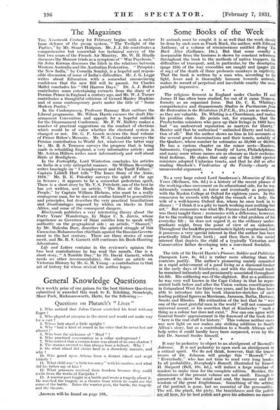The Magazines
Tim Nineteenth Century for February begins with a rather lame defence of the group system, , The Twilight of the Parties," by Mr. Stuart Hodgson. Mr. J. J. Ide contributes a comprehensive but somewhat too technical survey of the first two years of the French Air Ministry. Mr. W. H. Hindle discusses the Moscow trials as a symptom of " War Psychosis." Sir John Kirwan discusses the hitch in the relations between Western Australia and the Australian Federation. " PrOspice the New India," by Cornelia Sorabji, is a hopeful and respon- sible discussion of some of India's difficulties. Mr. J. G. Legge writes about Education with a somewhat unconvincing confidence that the new Bill will be passed. Sir Charles Mallet concludes his " Old Harrow Days." Dr. A. J. Butler contributes some entertaining extracts from the diary of a Persian Prince in England a century ago, and Mr.-W. J. Turner contributes a thoughtful criticism of Gerard Manley Hopkins and of some contemporary poets under the title of " Some Modern Poetry." In the Contemporary, Professor Ramsay Muir outlines the Liberal programme. Mr. Wilson Harris excuses the draft Dis- armament Convention and appeals for a hopeful outloOk for the Disarmament Conference. Mr. F. W. Raffety makes a number of practical suggestions on the conduct of elections which would be of value whether the electoral system ,is changed or not. Dr. G. P. Gooch reviews the final volume of Prince Billow's Memoirs. Mr. W. G. Constable surveys the Persian contribution to World Art, whatever the latter may be • Mr. B. S. Townroe surveys the progress that is be' made in rebuilding England, a very informative article ; and Mr. Ashton Millers writes most informatively and well about Birds at Bordighera.
In the Fortnightly, Lord Winterton concludes his articles on India in a very unhopeful manner. - Sir William Beveridge writes bracingly on " Unemploythent and the Tariff Fallacy. Captain Liddell Hart tells " The Inner Story of the Aisne, 1918." Mr. R. E. Priestley surveys the spirit of the age in Science ; it appears to be a somewhat pedestrian spirit., There is a short story by Mr. V. S. Pritchett, one of the best he has yet written, and an article, " The Rise of the Black People," by Captain William Hichens, who must be a really Courageous man, for he does not confine himself to generalities and principles, but describes the very practical humiliations disadvantages , irriposed-. by 'Whitei on -.blacks in Eaat Africa, and some of the consequent dangers. Blackwoods publishes a very interesting theory about the Forty. Years' _Wanderings, by Major C. S. Jarvis, whose
experience as Governor-of Sinai entitles him to speak with authority on the geographical side ; an article, Shamyl,"
by Mr. Malcolm Burr, describes the spirited struggle of this Caucasian-Mohammedan chieftain against the Russian Govern,- ment in the last century. There are three stories of some merit, and Mr: R. S. Garnett still continues his Book-Hunting Adventures.
Life and Letters contains in the reviewer's opinion the two best contributions he has read this month. One is a' short story, " A Terrible Day," by Mr. David Garnett, which needs no other recommendation, the other an article on Victorian History by Mr. G. M. Young—a contribution to that hurt of history for whose revival the author hopes.










































 Previous page
Previous page